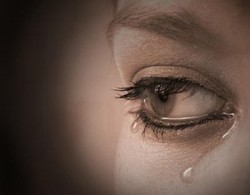People who have never experienced depression sometimes seem to view it as a sort of intense or prolonged sadness, but I think this is a misconception. Having been depressed myself, and talked to and read the accounts of numerous others, I feel very firmly that the two are not as closley related as people sometimes believe. Sadness is an emotion, a feeling, and depression is much more than a feeling, more of an all-encompassing state of being.
A depressed person can feel a wide range of emotions, or lack thereof. Some people can be depressed and still feel good or happy some of the time. In some cases, the happy feelings can feel distant or blunted, even if they show outwardly on a person's face. In other cases, a person may feel genuinely happy, quite often, but then later on, shuts out the memories of the earlier happy feelings.
Depression sometimes involves feelings of sadness, as well as other feelings like frustration, anger, shame, guilt, stagnation, agitation, annoyance, hostility, stress, or other feelings that aren't exactly the same as sadness. But when depression becomes very severe, often the feelings vanish entirely, and all that is left is a numbness, a lack of feeling.
I've heard people describe that, when in this state of numbness, even the most bitter emotional pain can feel intensely liberating. Imagine being unable to cry, and then feeling the release when you can actually cry. This may explain why some people find behavior like self-injury offers a release from depression. In my own experience, sadness, even intense sadness, is a much more positive feeling or experience than my most troubled moments that I've experienced during depression.
These things all point to how sadness and depression are two very different things.










 The Shaming of Femininity and Elevation of Masculinityon 07/13/2017
The Shaming of Femininity and Elevation of Masculinityon 07/13/2017
 What is Genderqueer or Non-Binary Gender?on 10/16/2015
What is Genderqueer or Non-Binary Gender?on 10/16/2015
 Resources for Learning Spanish Free Onlineon 04/13/2016
Resources for Learning Spanish Free Onlineon 04/13/2016
 Ways Native Plants Can Help Control Invasive Plantson 05/26/2016
Ways Native Plants Can Help Control Invasive Plantson 05/26/2016



Questions? Comments? Feedback?
cazort, The painting Never Morning Wore To Evening But Some Heart Did Break by Walter Langley is one of my favorites because it presents the problem along with what works as a cathartic remedy for me -- a body of water -- in the background.
The holistic approach is attractive because of the influence of known and unknown causes, factors, and triggers on emotional states.
Life can be depressing, and your strategies and suggestions all are viable. Exercise in particular is beneficial for me.
Thank you for sharing this information, which should be especially helpful for those who do not realize that, despite its seeming complexity, depression can be confronted with doable strategies available in daily life choices.
I think there's some truth in what you're saying, Ian, but I also think that it's complex. I do think depression is a bit of a "chicken and egg" thing, like, a cycle. If a person is depressed, they're not going to be likely to have as much motivation to pursue an exercise regime, improve their diet, or work through a book. At the same time, I do think these things can help, and if a person is not getting enough exercise or not eating well, that can contribute to depression.
Although viewed one way, this can make it challenging to overcome depression, I think it can also be empowering, because it means that there are multiple points or angles through which you can attack and overcome the depression.
I think the one thing that isn't fully true in the logic of your comment is the idea of "need". A person doesn't need to be cured fully (or partially) in order to take on these things. Each person is different, and some people will find certain approaches more challenging, and others easier or more accessible, than others. But I do think that every person has some agency, some "wiggle room", so to speak.
I think the very interpretation of these things as "depressing", as describing an impossibility, is itself part of depression. An important start is for a person to realize that they have some agency, some choice, some control. Resolve, determination, strength of will, focus, these are things that can be really important for overcoming depression.
Exercise, good diet, follow good counsel and read and follow the advice of books. It might seem that one needs to be cured before one can pursue this solution.
This is an excellent article on depression, one of the best I've read. Of course the depression will return, probably with a vengeance, once the drugs are taken away, and nothing else has changed. Also, I wonder just how much our current society seems to be contributing to depression, because so many people experience social isolation.
This is a very thorough and well-written article on understanding depression. My younger (adult) son has been having problems with depression and I have tendencies toward it also. I agree that exercise helps immensely. He's also getting counseling and is on some meds, but maybe he can get off them at some point. He's working at changing thought and behavioral patterns that exacerbate his depression. One word that you listed in the feelings that people have during depression is "stagnation". That one resonates especially with me! And it's hard to pull up out of that feeling sometimes!